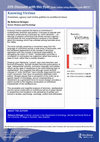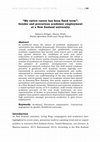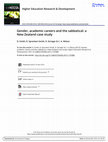Books by Rebecca Stringer

Knowing Victims explores the theme of victimhood in contemporary feminism and politics. It focuse... more Knowing Victims explores the theme of victimhood in contemporary feminism and politics. It focuses on popular and scholarly constructions of feminism as ‘victim feminism’ – an ideology of passive victimhood that denies women’s agency – and provides the first comprehensive analysis of the debate about this ideology which has unfolded among feminists since the 1980s.
The book critically examines a movement away from the language of victimhood across a wide array of discourses, and the neoliberal replacement of the concept of structural oppression with the concept of personal responsibility. In derogating the notion of ‘victim,’ neoliberalism promotes a conception of victimization as subjective rather than social, a state of mind, rather than a worldly situation.
Drawing upon Nietzsche, Lyotard, rape crisis feminism and feminist philosophy, Stringer situates feminist politicizations of rape, interpersonal violence, economic inequality and welfare reform as key sites of resistance to the victim-blaming logic of neoliberalism. She suggests that although recent feminist critiques of ‘victim feminism’ have critically diagnosed the anti-victim movement, they have not positively defended victim politics. Stringer argues that a conception of the victim as an agentic bearer of knowledge, and an understanding of resentment as a generative force for social change, provides a potent counter to the negative construction of victimhood characteristic of the neoliberal era.
This accessible and insightful analysis of feminism, neoliberalism and the social construction of victimhood will be of great interest to researchers and students in the disciplines of gender and women’s studies, psychology, sociology, politics and philosophy.
See below, under papers, for my chapter on the figure of the woman vigilante (R. Stringer, 'From ... more See below, under papers, for my chapter on the figure of the woman vigilante (R. Stringer, 'From Victim to Vigilante')
Papers by Rebecca Stringer

New Zealand Sociology, 2018
In neoliberal times the nature of academic employment in universities has shifted dramatically. P... more In neoliberal times the nature of academic employment in universities has shifted dramatically. Precarious (fixed-term and casual) academic employment has proliferated, continuing academic employment has become more scarce and a wide gap has opened between the conditions of work and career trajectories of academics in continuing positions—for whom a semblance of the tenure system remains intact—and the growing number of academics on temporary, insecure contracts, for whom the prospect of academic unemployment ever looms. International research indicates that this shift toward academic precarity is gendered, with academic women typically over-represented in precarious academic employment and under-represented in continuing positions and vice versa for academic men. To further our understanding of the way rising academic precarity and its greater impact on academic women have played out in Aotearoa/New Zealand, this article reports on academic perceptions and experiences of precarious academic employment at a New Zealand university. Statistical and inductive analysis of a mixed-method survey of 914 academic staff reveals extensive academic precarity at the case study institution, an over-representation of women in precarious employment, many more negative than positive experiences of precarious employment, and high motivation amongst precarious academics to gain secure employment.
Australian Feminist Studies, 2012
ABSTRACT

This article examines academics’ access to and perceptions of sabbaticals at a research-intensive... more This article examines academics’ access to and perceptions of sabbaticals at a research-intensive university in New Zealand. Statistical and inductive analysis of survey data from 915 academics (47% of all academics employed) revealed inequalities in access to and experience of sabbaticals, and highlighted academic, personal and gender issues. Men and women were generally united in their views on how family circumstances, children, childcare, partners, unfairness, inequity, transparency and finances, affected ability to take sabbatical leave, and that lack of transparency and gatekeeping were barriers to access. Yet, women indicated greater concern than men about the application process, adequacy of leave and the role of the Head of Department in accessing sabbaticals. Women were also significantly more likely to be ineligible for sabbaticals owing to casual employment status, and women who were eligible tended to take fewer, shorter sabbaticals. Academics view sabbaticals as vital for career progression and the findings highlight the need to facilitate equitable access to sabbatical leave across an institution. Universities need to audit the uptake of sabbaticals by eligible academics and review the processes associated with application, approval and support for sabbatical leave.

In his book The Differend Lyotard proposes a unique theory of the victim as a wounded subject who... more In his book The Differend Lyotard proposes a unique theory of the victim as a wounded subject whose wounding is not presently recognised in law and exists instead as a differend (a form of suffering that cannot presently be phrased in a shared idiom). Where ‘vulnerability’ refers to the ability to be wounded, Lyotard’s theory points up a second-order vulnerability: the ability to be wounded and to then have that wounding effaced (in language, by others, by the law). In this paper I draw on Lyotard’s theory to conceptualise feminist efforts to reform rape law and ameliorate its effacement of various forms of rape. My aim is to answer recent criticism of these feminist efforts as excessively focussed on women’s vulnerability to rape. As part of the ‘turn to agency’ in contemporary discussions of gender and vulnerability, many have argued that feminist-led rape law reform is counter-productive because it merely serves to reinscribe patriarchal representations of women as vulnerable to rape. They contend a better answer to the problem of rape lies with positive counter-images of women as agents who are capable of resisting rape. Lyotard’s theory of the victim enables me to clarify, however, that rape law has traditionally represented women as capable of resisting rape, invoking images of women as agents in order to deny that rape has taken place. In Lyotard’s terms, the ‘turn to agency’ in recent feminist discussions of rape has failed to take account of the character of the differend in rape law. My analysis demonstrates that not all representations of women as vulnerable to rape are counter-productive, and not all images of women as agents are progressive and liberating. I argue that the real ethical problem, which assumes particular significance in the context of neoliberalism, is that of finding a way to phrase women’s agency without reinscribing patriarchal representations of women as the blameworthy agents of rape.
Living Together: Towards sustainable settlements in New Zealand, eds Freeman and Thompson-Fawcett, 2005
Feminism at the Movies: Understanding Gender in Contemporary Popular Cinema, 2011
Australian Feminist Studies 27/71 (2012)
This article examines the events and texts of the Huggins-�Bell debate, in view of the revival of... more This article examines the events and texts of the Huggins-�Bell debate, in view of the revival of Bell’s ‘everyone’s business’ position in the current context of the Northern Territory Intervention. I argue that while there are disjunctures between the position Bell espoused and the measures taken in the Intervention, the Intervention’s policy approach of ‘practical reconciliation’ shares the signature features of Bell’s position. As in Bell’s work, the discourses supporting the Intervention use an ideology/practice binary to defend the morality of intervention, refuse to treat issues of lateral violence and racism intersectionally, and claim to bolster the authority of Indigenous women while engaging a practical effort to undermine that authority.

Australian Feminist Law Journal, Jan 1, 2006
This article is concerned with a newly emergent ‘pro-life’ political strategy in which legislatio... more This article is concerned with a newly emergent ‘pro-life’ political strategy in which legislation addressing violence against pregnant women comes to advance the anti-abortionist cause, through the conferral of enhanced legal status upon foetuses. I identify and analyse the workings of this strategy in the Unborn Victims of Violence Act 2004 (US), which codifies violence against pregnant women that results in loss of or damage to pregnancy as victimization of an unborn individual. I argue that this codification not only is politically partisan but conceptually untenable because it uses the ‘separate entities’ model of the maternal-foetal relation to narrate violence of this kind. I then compare the Unborn Victims of Violence Act with the Crimes Amendment (Grievous Bodily Harm) Act 2005 (NSW), which codifies violence resulting in loss of pregnancy as harm to the pregnant woman. I argue that this latter codification is preferable in two key respects. Its use of the ‘not-one-but-not-two’ model of the maternal-foetal relation more accurately reflects the nature of the harm caused in violence against pregnant women; and from a feminist perspective this approach effectively balances the imperatives of pro-choice and anti-violence politics, blocking the ‘pro-life’ strategy evident in the US legislation.
Borderlands, Jan 1, 2007
This essay provides a critical discussion of the Howard government's 2007 intervention into 73 Ab... more This essay provides a critical discussion of the Howard government's 2007 intervention into 73 Aboriginal communities in Australia's Northern Territory. Contending that the official purpose of the intervention differs from its actual purpose, the paper argues that the federal government has mobilised issues of violence, abuse and neglect in these communities as a pretext for advancing an unrelated agenda. The paper characterises the intervention as neocolonial and its actual agenda as one of assimilatory neoliberation. It encompasses discussion of the privatising of Indigenous lands, the corporatising of Indigenous governance, the disciplining of Indigenous labour, and the violations of land, sovereignty and human rights the intervention entails.
Outskirts: Feminisms Along the Edge, Jan 1, 2001
Rebecca Stringer (2000), ‘“A Nietzschean Breed”: Feminism, Victimology, Ressentiment,’ Why Nietzsche Still? Reflections on Drama, Culture and Politics, ed. Alan D. Schrift (Berkeley: University of California Press): 247-273.
International Journal of Drug Policy, Jan 1, 2005










Uploads
Books by Rebecca Stringer
The book critically examines a movement away from the language of victimhood across a wide array of discourses, and the neoliberal replacement of the concept of structural oppression with the concept of personal responsibility. In derogating the notion of ‘victim,’ neoliberalism promotes a conception of victimization as subjective rather than social, a state of mind, rather than a worldly situation.
Drawing upon Nietzsche, Lyotard, rape crisis feminism and feminist philosophy, Stringer situates feminist politicizations of rape, interpersonal violence, economic inequality and welfare reform as key sites of resistance to the victim-blaming logic of neoliberalism. She suggests that although recent feminist critiques of ‘victim feminism’ have critically diagnosed the anti-victim movement, they have not positively defended victim politics. Stringer argues that a conception of the victim as an agentic bearer of knowledge, and an understanding of resentment as a generative force for social change, provides a potent counter to the negative construction of victimhood characteristic of the neoliberal era.
This accessible and insightful analysis of feminism, neoliberalism and the social construction of victimhood will be of great interest to researchers and students in the disciplines of gender and women’s studies, psychology, sociology, politics and philosophy.
Papers by Rebecca Stringer
The book critically examines a movement away from the language of victimhood across a wide array of discourses, and the neoliberal replacement of the concept of structural oppression with the concept of personal responsibility. In derogating the notion of ‘victim,’ neoliberalism promotes a conception of victimization as subjective rather than social, a state of mind, rather than a worldly situation.
Drawing upon Nietzsche, Lyotard, rape crisis feminism and feminist philosophy, Stringer situates feminist politicizations of rape, interpersonal violence, economic inequality and welfare reform as key sites of resistance to the victim-blaming logic of neoliberalism. She suggests that although recent feminist critiques of ‘victim feminism’ have critically diagnosed the anti-victim movement, they have not positively defended victim politics. Stringer argues that a conception of the victim as an agentic bearer of knowledge, and an understanding of resentment as a generative force for social change, provides a potent counter to the negative construction of victimhood characteristic of the neoliberal era.
This accessible and insightful analysis of feminism, neoliberalism and the social construction of victimhood will be of great interest to researchers and students in the disciplines of gender and women’s studies, psychology, sociology, politics and philosophy.